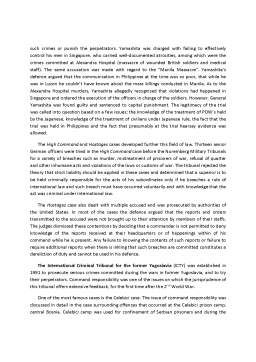Extras din referat
Superior responsibility is a form of liability for omission to act: a superior may be held criminally responsible when despite his awareness of the violations of his subordinates he culpably doesn’t fulfill his duty to prevent and punish.
A commander – defined as any person in charge or in apposition of control – who order his subordinates to commit a war crime or a grave breach is to be held accountable for the deed and is considered as guilty as the subordinate who actually committed it.
On the same manner, according to art. 87, AP I, a commander has the duty
- to prevent and to suppress the possible breaches and also to report to competent authorities.
- if he is “aware” that such violations were or are to be committed by his subordinates, to adopt the necessary measures to prevent such violations and to initiate disciplinary or penal actions against the violators
Therefore, any commander, that is in the possession of information from which he should have concluded that one of his subordinates was going to commit such a crime and failed to prevent it, or if he has the knowledge of such a violation, but he doesn’t initiate disciplinary or penal actions is to be held liable for his subordinates actions.
A commander has also the duty to ensure that the members of the armed forces have knowledge about their obligations, thus if he fails to exercise proper control over them resulting with the commission of war crimes, even if he remains unaware of the situation, when he should have known, is to be held accountable.
Responsibility of commanders is regulated also in Rome Statute of the International Criminal Court, art. 28. According to this, a commander becomes criminally accountable, if he “knew or owing to the circumstances at the time should have known” that the crimes were committed or were about to be committed by forces under his effective control, and failed to take the necessary measures to prevent or repress the criminal deeds or to report the matter to the competent authority in order for an investigation to be conducted.
Art. 7(3) The statute of the International Criminal Tribunal for the former Yugoslavia (ICTY) states that a commander is criminally responsible for the acts of his subordinates if “he knew or had reason to know” about the possible or actual commission and failed in his duty to adopt the necessary and reasonable measures to prevent such acts or to punish the perpetrator/s.
The doctrine applies not only to military commanders, but also to paramilitary leaders and civilian officials.
Paragraph 2 of art.28, ICC Statute puts liability also on civilian superiors, for the acts of their subordinates in the same way as military commanders. There is a difference however, the requirement is that the civilian superior either knew or he “consciously disregarded” the information which “clearly” indicated such violations, and such disregarded must be substantiated by evidence.
Under customary international law, there are three requirements recognized as forming part of the superior responsibility doctrine:
1) A relationship superior- subordinate. To determine the nature of command, the test used in this context is one of “effective control” over a subordinate. If the accused person is exercising effective control over the person committing the crime is he or she that person’s superior.
- Between the superior and the persons committing the breaches there must be a hierarchical relationship. That relationship must be de jure (the relationship of authority is based on regulations) or de facto (based on the state of affairs), since the conflicts in the former Yugoslavia and Rwanda saw instances when offences were committed by paramilitary and irregular militia forces.
- In the jurisprudence there is a controversy concerning the time of the existence of this link: either at the time the crimes were committed or at the time he failed in his responsibility to take reasonable measures.
- Exercising “effective control” means that the subordinates must possess the material ability, at the relevant time to prevent and punish the actions of his subordinates. There must exist also an obedience to orders and expectation of subjection to the authority of the superior on behalf of the subordinates.
- In case of non-military superiors, provided that they had “effective authority or control” over the person/s that committed the crime, the civilian superiors can incur command responsibility under Art. 28(b).
- ICTY (Celebici case) enumerates some factors that may be generally indicative of an accused’s position of authority, among which there are: the accused’s official position, his or her capacity to issue orders, the procedure for appointment, the accused’s position in the military or political structure, and the actual tasks that he or she performed.
- Superior higher up in the chain of command can be held accountable, as the superior-subordinate relationship does not necessary need to be proximate. In case of multiple Commanders who are equal in the Chain of Command, all the persons who exercise effective control over subordinates are to be held accountable. Thus, more than one superior may be responsible for crimes committed by the same subordinates.
Preview document
Conținut arhivă zip
- Responsibility of Superior - Command Responsibility.docx







